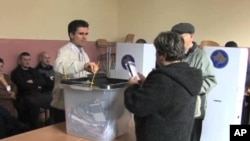Incumbent Prime Minister Hashim Thaci is now trying to form a government after winning Kosovo's first parliamentary election since it declared independence from Serbia nearly three years ago.
Supporters of Prime Minister Hashim Thaci are celebrating his party's win in Kosovo's historic election.
The Central Election Commission announced that Mr. Thaci's Democratic Party of Kosovo got 33.5 percent of the vote. The Democratic League of Kosovo led by Isa Mustafa was second with 23.6 percent.
Thaci's failure to win an outright majority means he'll have to form a coalition government with some of his rivals.
That won't be easy, says political analyst Krenar Gashi of the Kosovo Institute for Policy Research and Development. "The second, the third and the fourth party have openly declared that they don't want to enter any coalition with Prime Minister Thaci," said Gashi.
Thaci's transformation from Kosovo Liberation fighter to Prime Minister has come under the spotlight in a new investigation to be presented to the Council of Europe. The report claims Prime Minister Thaci is the head of a "mafia-like" crime group known as the 'Drenica Group' responsible for assassinations, drug smuggling and even organ trafficking arranged through clinics like this one near Pristina.
Kosovo's government dismissed the report as an attempt to slander the country's leaders.
Meanwhile opposition parties are claiming election fraud and demanding re-runs after an unlikely 95 percent turnout was recorded in two districts.
But E.U. observers have praised the largely peaceful election. "The security situation was calm and quiet. There were some incidents, but not major ones. We had around 500 police officers ready if something happened, but, fortunately, nothing happened," said Kristina Herodes, judicial spokeswoman for the E.U. rule of law mission in Kosovo.
The biggest election flaw remains the boycott of the vote by ethnic Serbs in the north, under pressure from Serbia. The government in Belgrade has refused to recognize Kosovo's independence since it broke away from Serbian control. "It's very significant. For the first time, Serbia openly expressed its ambition for the partition of Kosovo and this is now slowly becoming the official policy of the Belgrade government," Gashi said.
Prime Minister Thaci has repeatedly stated his desire for Kosovo to join the European Union.
Apart from a couple of incidents, E.U. observers say they are generally happy with the way the election was conducted. The question now is whether Prime Minister Thaci can form a coalition government and whether that government will be strong enough to restart talks with Serbia.




